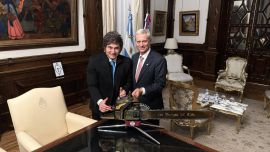The meeting, which runs until Sunday, drew former presidents Dilma Rousseff (from Brazil), Fernando Lugo (Paraguay) and Ernesto Samper (Colombia) to the capital, with other attendees including Uruguayan presidential candidate Daniel Martínez, of the leftist Frente Amplio, who faces a runoff vote on November 24.
The event was backdropped by the dramatic release from jail on Friday of former leftist president Luiz Inácio Lula da Silva. The iconic leader – who was serving a sentence of eight years and ten months in prison for corruption and money-laundering, under the framework of the ‘Lava Jato’ investigation – was freed from prison in Curitiba less than a day after the Supreme Court ruled that a person can be imprisoned only after all the appeals have been exhausted.
NEW DIRECTION
The Grupo de Puebla meeting is the clearest indic a t i o n y e t o f w h a t Argentina’s foreign policy approach will be under Fernández. It’s the second summit of the group, which was founded in Mexico in late July, with the Frente de Todos leader as one of its main drivers.
“We want to look for in our differences what unites us. This meeting is an invitation to reflect acting with 32 progressive leaders from 12 countries,” read promotional literature for the event.
The group has emerged as a clear counterpart of the Grupo de Lima, an initiative that opposes the government of Nicolás Maduro in Venezuela and seeks his removal from office.
In a clear clash of timing, its members met in Brasilia on Friday to analyse the situation in the crisis-stricken country and debate its next steps. It is the group’s first meeting since Fernández won the election.
In a September statement, the Grupo de Puebla said it rejects any military intervention in Venezuela or any other use of force. On the campaign trail, Fernández advocated non-interventionist policies, echoing stances taken by Uruguay and Mexico. He reiterated that stance during his visit to Mexico City this week to see President Andrés Manuel López Obrador.
On Friday, Maduro celebrated the Frente de Todos election, saying that “the breeze of Perón and Néstor Kirchner is being felt in Argentina.”
“Now it’s up to Mr. Alberto Fernández, to take on a very hard, complex situation,” he said. “I hope Argentina wakes up because Latin America needs a strengthened, awake, vital Argentina.”
Peru calls for a reboot of the Lima Group in Brasilia
The Peruvian government called for a review of the Grupo de Lima and its actions on Friday, as it admitted it had reached stalemate.
“Our actions have produced some important things, but not the peaceful return of democracy” in Venezuela, Peru’s Foreign Minister Gustavo Meza-Cuadra said, at the inauguration of a ministerial meeting held in Brasilia.
He called on the group’s members to open channels of dialogue with all nations, including those that support the Nicolás Maduro administration .
“Given this scenario, we must maintain unity,” promote “a peaceful solution more effectively” and maintain “pressure on the regime,” added Meza-Cuadra, who warned the group’s members must not fall into the trap of repeating its positions endlessly.
Foreign Minister Jorge Faurie was among those in attendance at the meeting, which also included officials from Brazil, Colombia and Chile, among other nations.
The meeting comes at a crucial moment for the region, in which the collective needs to re-evaluate its objectives if it is to reach a common regional position on the crisis in Venezuela.
“The Lima Group has to revise its positions because the Argentina case has changed the internal working realities of the group,” said political analyst Alberto Adrianzen to AFP.
The bloc is no longer “the Lima Group that applied the diplomacy of United States president Donald Trump in the region,” he said.
Alberto Fernández, Argentina’s newly elected president, has advocated noninterventionist policies similar to those of Mexican leader Andrés Manuel López Obrador during his campaign. “Dictators have non-democratic origins. That’s not the case in Venezuela,” Fernández said in an August interview with a local TV station.
Such comments have generated angst among some Latin American neighbours, who fear the rise of Fernández’s Frente de Todos party to political power marks the loss of another country to the left.
The Lima Group, which joined 12 Latin
American countries and Canada to
search for an end to the Venezuelan crisis, was created in 2017. related news



















Comments